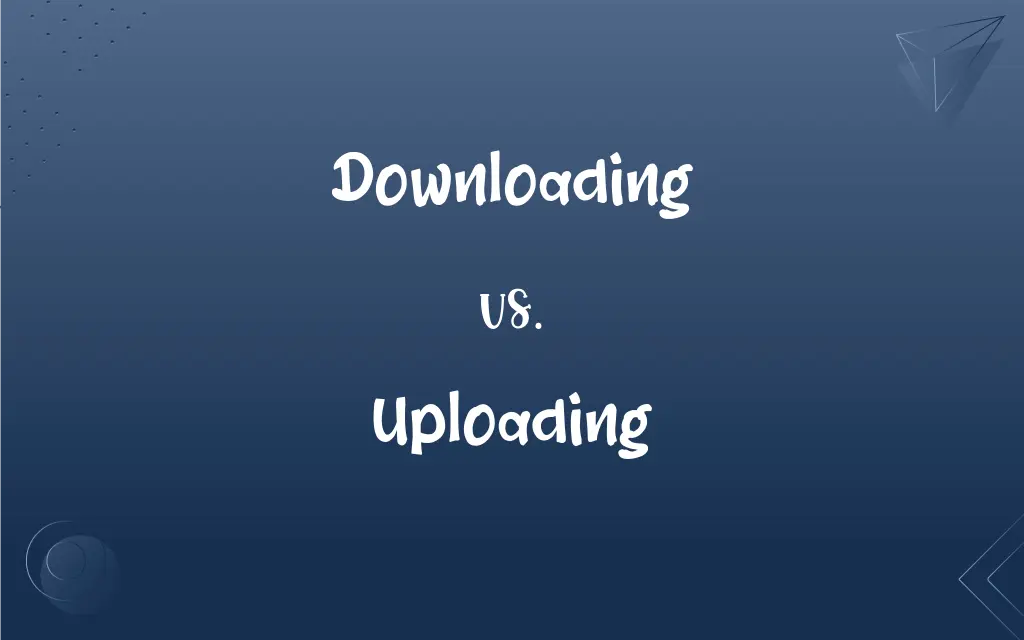Downloading vs. Uploading: What's the Difference?
Edited by Aimie Carlson || By Harlon Moss || Published on February 1, 2024
Downloading is the process of receiving data from a remote system, typically a server, to a local system; uploading is sending data from a local system to a remote system.

Key Differences
Downloading refers to the process of transferring data, such as files or media, from a remote server or system to a user's local device, like a computer or smartphone. It is a common activity in everyday internet usage, where users receive data from the internet. Uploading, in contrast, involves sending data from a user’s local device to a remote server or system. This action is often seen when users post pictures on social media or submit files to a cloud storage service.
When downloading, the user is the recipient of data. The speed and efficiency of downloading can depend on various factors, including the user's internet connection and the server's capacity. Uploading, on the other hand, makes the user the source of the data transfer. The quality of the upload can be affected by the user’s internet upload speed, which is often different from the download speed.
Downloaded data is typically stored on the user's device, allowing offline access once the download is complete. Common examples include downloading music, documents, or software. Conversely, uploading results in data being stored on a remote server, which may then be accessed or downloaded by other users, as seen in file-sharing services.
Data integrity and security are crucial in both downloading and uploading. During downloading, it’s important to verify the authenticity and safety of the source to prevent malware. In uploading, users must often consider privacy and data security, especially when uploading sensitive information to online platforms.
Downloading and uploading are complementary processes involving the transfer of data over the internet or other networks. Downloading brings data to a user’s local device, while uploading sends it from a local device to a remote location, each with its unique considerations regarding speed, data integrity, and security.
ADVERTISEMENT
Comparison Chart
Data Direction
From remote system to local device
From local device to remote system
Typical Use
Receiving files, media, software
Sending files, media, posts
Storage Location Post-Transfer
Locally on user’s device
On remote server or system
Speed Determinants
Dependent on download speed of user's internet
Dependent on upload speed of user's internet
Common Examples
Downloading a movie, software update
Uploading a photo to social media, files to cloud storage
ADVERTISEMENT
Downloading and Uploading Definitions
Downloading
It involves saving data, like files or media, from a remote server to your device.
She was downloading important documents for the meeting.
Uploading
This process enables sharing of personal content on web platforms.
He was uploading an article to his blog.
Downloading
Downloading is the process of receiving digital content from a remote source.
He started downloading the new software update for his phone.
Uploading
It involves transferring files or content from a user’s device to the internet.
She spent the morning uploading her latest podcast episode.
Downloading
Downloading is the act of receiving data from the internet to a local device.
I finished downloading the latest episode of my favorite show.
Uploading
Uploading refers to the act of posting or submitting digital content online.
They were uploading a video presentation to the company server.
Downloading
Downloading enables users to access and store online content locally.
She was downloading music to listen to offline.
Uploading
Uploading allows for data storage and sharing on cloud services.
She was uploading important files to her cloud backup.
Downloading
This refers to transferring data from a website or server to a personal device.
They were downloading photos from their cloud storage.
Uploading
Uploading is sending data from your local device to a remote server or website.
He was uploading his vacation photos to a social media site.
Downloading
Infl of download
Uploading
Infl of upload
Downloading
The process by which something is downloaded.
Uploading
The process by which something is uploaded.
FAQs
What does uploading mean?
Uploading is sending data from a local device to a remote system or server.
Is uploading data always secure?
Uploading can be secure, but depends on the security measures of the platform used.
Can downloading affect my device’s storage?
Yes, downloading files consume local storage space on your device.
How is downloading different from uploading?
Downloading is receiving data, while uploading is sending data to a remote location.
Can I upload any type of file?
Most platforms allow various file types, but some may have restrictions or size limits.
What is downloading?
Downloading is receiving data from a remote system to a local device over the internet.
Do I need special software to download files?
Generally, no, but some files may require specific applications to open or use.
Is it free to download files from the internet?
Many downloads are free, but some content may require payment or subscriptions.
What is the risk of uploading sensitive information?
Uploading sensitive data carries a risk of privacy breaches if the platform isn’t secure.
Can I download anything from the internet?
You can download most content, but be mindful of copyright and legality.
What factors affect upload speed?
Factors include internet upload speed, file size, and server capacity.
How do I improve my downloading speed?
Improving internet connection, using a wired connection, or downloading during off-peak hours can help.
Why is my downloading speed slower than advertised?
Download speed can vary due to network congestion, server speed, and connection quality.
Does downloading use a lot of data?
Yes, downloading large files or media can consume significant data.
Are there limits to uploading files online?
Some services have limits on file size or type for uploads.
Can I cancel an upload in progress?
Yes, uploads can typically be canceled, but the process varies by platform.
How do I know if a download is safe?
Ensure the source is reputable, and consider using antivirus software.
Why is uploading taking so long?
Upload speed can depend on your internet connection and the file size.
Can I download a file to multiple devices?
Yes, as long as you have access to the file, it can be downloaded on multiple devices.
Can I resume an interrupted upload?
Some platforms support resuming uploads, but it’s not universal.
About Author
Written by
Harlon MossHarlon is a seasoned quality moderator and accomplished content writer for Difference Wiki. An alumnus of the prestigious University of California, he earned his degree in Computer Science. Leveraging his academic background, Harlon brings a meticulous and informed perspective to his work, ensuring content accuracy and excellence.
Edited by
Aimie CarlsonAimie Carlson, holding a master's degree in English literature, is a fervent English language enthusiast. She lends her writing talents to Difference Wiki, a prominent website that specializes in comparisons, offering readers insightful analyses that both captivate and inform.

































































